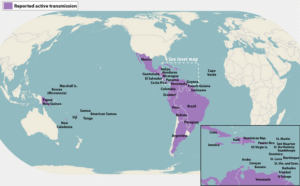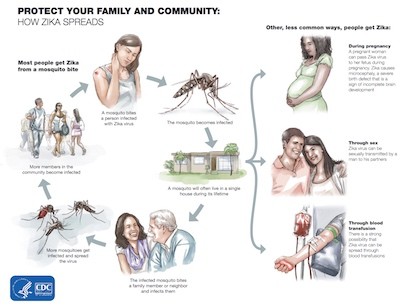Update on the Zika Virus Travel Alert
Back in January, we shared with you that the CDC had issued a travel alert to those who are considering travel to areas that present the opportunity of exposure to the Zika Virus.
Sadly, because of this and other mosquito-born illness, the affected regions are really starting to feel the economic pinch as concerned travelers avoid the area.
Carol and I were recently on a webcast presented by ASTA (American Society of Travel Agents) presenting information that they recommended that we pass along to you.
Important Things to Know About the Zika Virus
 Countries & Territories with Active Zika Virus Transmission – currently the virus presents in Mexico, most of the Caribbean, Central America, nearly all of South America, a few of the South Pacific Islands, Cape Verde in South Africa, and Papua New Guinea.
Countries & Territories with Active Zika Virus Transmission – currently the virus presents in Mexico, most of the Caribbean, Central America, nearly all of South America, a few of the South Pacific Islands, Cape Verde in South Africa, and Papua New Guinea.- While this list seems alarming, when you consider the millions of folks that live and have traveled to these areas, the number of infection cases remains relatively small. Nonetheless, the virus seems to continue spreading and you should be aware if you’re considering travel to any of the affected areas.
- One of the problems with the Zika virus is that the symptoms are generally so mild that travelers are not even aware that they are affected.
- Zika is predominantly spread by mosquito, but scientists are now learning that the virus can also be spread from an infected individual to a baby during pregnancy, through sexual contact, and blood transfusions.
- One of the big concerns in the scientific community is that infected individuals will bring the virus back home, and further spread the virus to mosquito populations throughout the world by a mosquito biting an infected person thereby creating the possibility of outbreaks in other parts of the world.
- The scientific community is working hard to create a simple test that might demonstrate if a traveler is infected by the virus.
- The greatest danger seems to exist with women of childbearing age as this virus possesses the possibility of infecting the fetus with a birth defect called Microcephaly which is a condition where a baby’s head is developed much smaller than expected.
To learn more about this important travel alert, read the CDC Zika Website.
What to do?
- Well, first of all, be informed.
- Secondly, if you’re a woman of childbearing age, the virus is dangerous to your fetus. And while the chances of infection might be very low, I wouldn’t want the young women in my family taking a chance. Rather than taking your honeymoon in the Caribbean, head to Hawaii.
- Third. Don’t panic. A healthy dose of prevention from mosquito bites can go a long ways with proper clothing, mosquito repellents, and avoiding specific areas where mosquitoes breed. Carol and I will be visiting Puerto Rico in the fall and we intend to keep prevention front and center in our minds.
We have many friends and travel partners in the affected areas of this virus and it saddens us to see their regions and travel brands suffering a potential economic downturn from this outbreak. We’ve certainly noticed that our honeymooners are avoiding the area.
So, it is our hope and prayer that the medical community can find a way to eradicate this virus and allow folks to travel to these areas without giving any thought to a pesky mosquito.
If you enjoyed this article, sign up for our monthly newsletter to keep abreast of our best travel tips, on-location reviews, exclusive travel offers, group travel events, and much more.

 The Roaming Boomers
The Roaming Boomers




